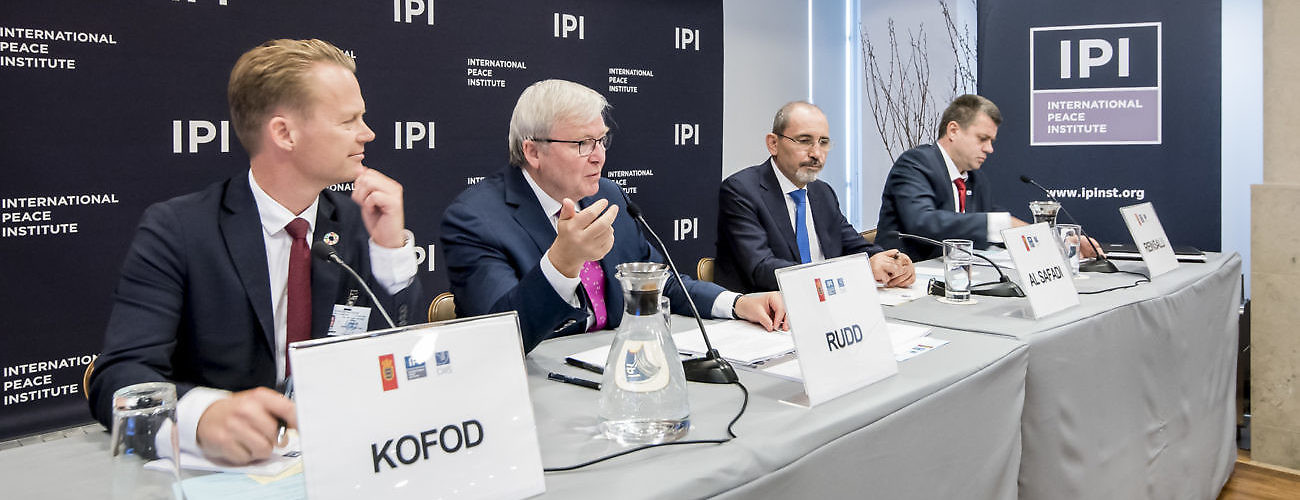Two foreign ministers recently took issue with the currently fashionable notion that patriotism and multilateralism are incompatible. The exchange took place during an IPI high-level panel on multilateral engagement for peace and security by small and medium states.
“I think you can be a patriot and a multilateralist at the same time, and small states actually show that it’s possible,” said Jeppe Kofod, Denmark’s Minister of Foreign Affairs. “You can love your country and way of life, and at the same time you can love international cooperation.”
Ayman Al Safadi, Jordan’s Minister of Foreign Affairs, was even more emphatic, asserting that being a patriot meant you had to be a multilateralist. “If you‘re a patriot, you’ve got to be a multilateralist because patriotism is all about doing what is good for your country, and multilateralism is a certain path to increasing our ability to address challenges and seize opportunities.”
Kevin Rudd, Chair of IPI’s Board of Directors and moderator of the event, also supported the sentiment. “My simple way of saying it is, ‘multilateralism is in the national interest,’” he said. “Those who argue that nationalism and multilateralism represent polar opposites… frankly, that’s an intellectual delusion.”
The September 25th high-level panel, which also featured Urmas Reinsalu, the Estonian Minister of Foreign Affairs, was cosponsored by IPI, the Danish Institute for International Studies (DIIS), and the Danish Ministry of Foreign Affairs. It was weighing whether the rising tides of nationalism, protectionism, and xenophobia which are undermining collective action and emboldening big powers, are also spurring a countervailing renewed commitment to the multilateral system among small and medium states.
In opening remarks, Louise Riis Andersen, Senior Researcher, Foreign Policy at DIIS, lamented the retreat from multilateralism but cautioned against excessive pessimism. “We need to focus not just on the shortcomings of the existing system, but we also need to focus on where the system does work and is delivering results, pointing out where new actors and alliances are stepping up,” she said.
Turning that focus onto small and medium states, IPI President Terje Rød- Larsen said, “We see many examples of these small and medium states working together, and we want to look at what lessons these examples offer. These states are most at risk. Less structure weakens the small and strengthens the big.”
Mr. Rudd recalled that when he was the Prime Minister of Australia, he coined the phrase “creative middle power” to describe how smaller states could best leverage their influence through the multilateral system.
“The unifying idea was that some of us in the international system, particularly small and medium states, have a particular responsibility to continue to defend, strengthen, and augment the multilateral system as a public good in itself, not just for what the multilateral system means for us, but as a public policy goal in itself,” he said. “And the reason for that is ultimately, great powers have about them a particular delusion–they think they can look after themselves, and they don’t need a system.”
Mr. Al Safadi argued that “the fact that multilateralism is under threat does not mean we should abandon it. We must adhere to it even more. The pressure is on us to keep the narrative alive, to keep sending the message that isolation is no option.”
The Estonian minister said that multilateralism is especially valued by small and medium states, and in particular by states in the European Union. “For small and medium countries, basically if they do not appear to have nuclear rockets, the international law system is their main guarantee of independence and national interests,” Mr. Reinsalu remarked. “We in the EU are able to achieve results with a core outcome of policymaking where small and big countries have the same amount of say, and this is the most important feature of the EU.”
Mr. Kofod asserted, however, that it is important for leaders to acknowledge how the system is often found wanting by the public. “Remember that some of the reasons that multilateralism is under pressure is that many people feel that it doesn’t deliver on their concerns whether it’s terrorism, migration, climate change,” he said. Expressing a similar view, Mr. Al Safadi added, “Multilateralism is under threat from the receiver side. Public opinion has lost confidence in it because there was a failure to deliver.”
Mr. Al Safadi observed that the value of the multilateral system is that “there is strength in numbers, but also strength in vision and even more in our ability to translate vision into action.”
Mr. Al Safadi listed three global crises where he said only multilateral means could produce progress. “In the Israeli-Palestinian conflict, we have not found any solution because the values of multilateralism, of international law, have not been brought and applied there,” he said. On refugees, he explained “the most difficult consequences of the refugee crisis are borne by neighboring countries, and this is when multilateralism is necessary…unless we all come together, there is no way we can tackle that challenge, and then it will only multiply.” And on terrorism, he said, “The disastrous consequences are on all of us, and no one country can deal with it on their own because to terrorists there are no borders, everyone is a legitimate target. We can only tackle it if we work together because terrorists will move and crop up somewhere else.”
Mr. Kofod called for small and medium states to lead by example and noted that Denmark had just shown the way on climate change by adopting an ambitious target for climate emissions reduction of 70% by 2030. “The way to win moral support for the rules-based order and multilateralism again is to show that it really makes a difference.”
During his closing remarks, Mr. Rudd referenced a two-year IPI-led effort, the Independent Commission on Multilateralism, that analyzed the multilateral system through the lens of fifteen issue areas.








